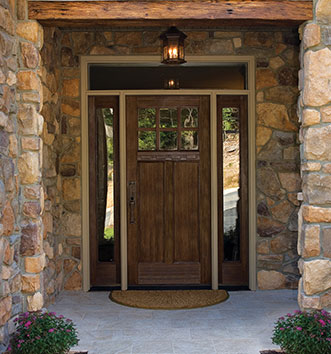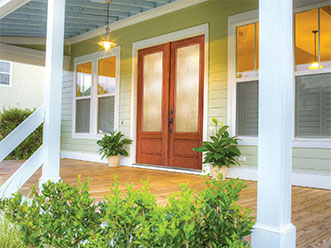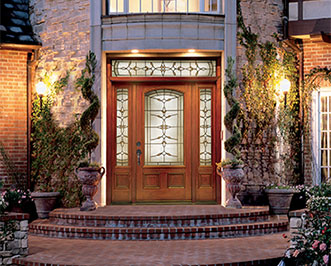Why Fiberglass Is the Answer for Your Front Door
by Rachel Lyon, Editorial Director for The House Designers
Most people don’t put much thought into the specific building materials used in residential construction—until they start building their own homes. You probably don’t have much of an opinion until you’re driven into doing some research, but we want to make it easier for you! When it comes to entry doors, there is a huge variation in energy efficiency, durability, and flexibility across the board for the different materials used in their assembly, and the one you ultimately select will affect your home for many years. That’s why we recommend fiberglass doors over solid wood or steel ones for our customers—keep reading to learn why!
Maintenance and Longevity
Any product that maximizes beauty while minimizing upkeep is a winner the way we see it. Fiberglass doors far outshine the competition in these categories, and they are perfect for the vast majority of consumers. Most of us want to enjoy our homes with little effort, so choosing a low-maintenance, durable entry door is important. Considering all the use it gets and the fact that it is the first place people look when they see your home, this is definitely an area you should invest in.
Natural wood is a demanding material when exposed to the elements—which your front door will have to resist. It should be refinished every couple of years at least, to ensure that it continues to look its best and to buff out any dings and scratches that could cause it to accrue damage more quickly. Despite the care put into it, wood can still fall prey to the environment, by warping with moisture exposure and cracking in extreme weather. And the last thing you want is a door that rots, but this can easily be a reality depending on your environment and how well you preserve this organic material.
In response to the downfalls of natural wood, many people moved to installing steel doors when they became available. With an image of strength and permanence, steel seems like a great choice, but it still has problems with exposure. A solid steel door would be extremely heavy and break off its own hinges, so any door you find in this category actually has a thin metal skin over an insulating core. As a result, it can be scratched and dented, and that damage can result in rust before you know it. You will need to properly maintain the exterior to prevent this natural degradation.
Finally, fiberglass is the newest material on the market, and it addresses the issues faced by those that preceded it. A durable manmade composite, fiberglass is solid and won’t rot or rust. It doesn’t absorb moisture, and it is much more stable in fluctuating temperatures. A fiberglass door can be painted or stained to achieve the look you want; when the elements wear down its finish over the years, all you have to do is wash the door surface and then reapply topcoat to keep it looking great. This no fuss, no muss choice usually comes with an impressive warranty that outshines that of the competition, so you will feel secure in your decision!
Efficiency Comparisons
Green building is a big deal, and for good reason. Putting your buying power behind energy-efficient products helps to preserve our resources, and you’ll notice the difference in how your home feels and how that translates to your bills. The efficiency of an entry door is affected by its level of insulation and the quality of its seals, and you will notice if either of these components isn’t up to par. The foyer might be colder than the rest of the house, and you could feel drafts seeping through the doorway even when it’s closed. A more efficient door will combat these common problems to help make your home more comfortable.
When it comes to insulation, you’ll find different insulating cores in doors of any type. Many wooden doors are solid, but in the interest of increasing efficiency, many offered now feature wood panels over polyurethane cores. Steel doors come in a wide range of efficiencies depending on quality, but they will never compare to the good feel of a wooden door. If you know how cold steel doors can feel during the winter, you’ll know why their efficiency can come into question. Another issue with these materials is that they expand and contract in response to moisture and temperature changes, and that can compromise how well they open and close and the tightness of their seals. And that translates into higher heating and cooling costs.
On the other hand, fiberglass doors have the best insulating properties around. They trump steel when it comes to thermal insulation and will feel much warmer to the touch no matter the weather outside. Sub-zero to triple digit temperatures won’t lessen the integrity of their seals; they’re tested to ensure that they stand up to these conditions. A manufactured door is built with weather resistance in mind, so you’ll find that everything from composite rails to weather strips, corner seal pads, and door sweeps is available to make the most of this improved defense.
Cost for Quality
The first fiberglass doors didn’t make the best impression until technology developed to turn them into the masterpieces they are today. Far from being plain, fiberglass gives you plenty of finishing options, and it eclipses what you can get from wood or steel. These doors can be engineered with flat, smooth exteriors for easy painting, but they are quickly becoming favored for the different woodgrain textures that make them look like natural wood doors. With a range of grains to consider, and the fact that you can stain them any color you like, fiberglass is the most stylistically versatile material out there, and homeowners are loving it.
With amazing looks and offering tons of flexibility, you might think that fiberglass doors are the more expensive option—but that isn’t the case! Wood doors actually cost the most, because a lot goes into harvesting and processing them, and certain tree species that are particularly favored come at a premium. You can get many of those sought-after woodgrains convincingly recreated on a quality fiberglass door for about half the price of the genuine article, which creates a rare win-win situation for today’s discriminating consumer. Occupying the middle of the market and offering nothing but advantages, this should be the first place you look for a great door. There are also great lower-end fiberglass doors if you’re on a budget, but the least expensive options will always be made of steel.
If you’d like to explore the possibility of adding a fiberglass door to your home, look no further than the amazing selection available from Therma-Tru® Doors. Their top-of-the-line Classic-Craft® Premium Entryways are carefully constructed with painstaking attention to detail, so your front door will have the look, feel, and heft of natural wood but at a fraction of the cost and without the maintenance. Fiber-Classic® Entry Doors are a stunning budget-friendly option to look into as well. Both of these lines have been named Best Buys by Consumers Digest, owing to their cost, quality, and lifetime limited warranty. Therma-Tru® offers a range of fiberglass entry doors to fit all architectural styles, so find your local dealer to start planning for your own home!



.png)
.png)




